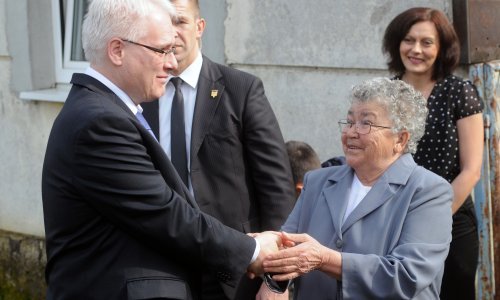Croatian President Ivo Josipovic on Sunday laid a wreath and lit a candle at a monument commemorating people killed in the aftermath of World War II in May 1945 at the Dobrova cemetery in Tezno, a suburb of the Slovenian city of Maribor, expressing hope that his act would put an end to one circle of disputes about Croatia's antifascist past.
In a brief statement to reporters after the wreath-laying ceremony, Josipovic said that he was glad to have been joined in paying tribute to the victims at Tezno by representatives of the Croatian Association of Antifascist Fighters and Antifascists (SABA), who he said had demonstrated the strength of the victors to face the dark side of their victory.
"I thank all who came here because this puts an end to one circle of disputes regarding Croatia's antifascist past, which undoubtedly had a side to it that it should not have had," said Josipovic.
The mass grave at Tezno near the Slovenian city of Maribor is one of the biggest registered post-WWII mass graves in Slovenia, containing the remains of people killed by Yugoslav communist authorities in 1945. It is probably the biggest mass grave of Croats killed on their way back from Bleiburg, Austria. The grave is an anti-tank trench several kilometres long, which contains the remains of at least 18,000 people, mostly soldiers of the Nazi-styled Independent State of Croatia (NDH), who in late May 1945 were brought from a camp in Maribor to what today is the Dobrova cemetery and executed there.
The delegation accompanying President Josipovic during the visit to Tezno included Administration Minister Davorin Mlakar, MP Nenad Stazic, SABA representatives, members of the Serb National Council Milorad Pupovac, Cedomir Visnjic and Sasa Milosevic, a representative of Roma associations, Nora Ismailovski, representatives of the Homeland War Veterans Council, and the head of the expatriate Croat Roman Catholic communities, Ante Kutlesa, who represented the Catholic Church.
After visiting Tezno, President Josipovic and a part of his delegation went on to Bleiburg in Austria, to lay a wreath at a memorial erected there.
Most representatives of SABA, as well as representatives of the Serb National Council, headed by Milorad Pupovac, would not travel to Bleiburg, telling the press they had nothing to do there.
Vesna Konstantinovic Culinovic of SABA told reporters that President Josipovic would visit Bleiburg because he had never been there before, but that SABA representatives believed that they had nothing to do there.
"There are no victims there, especially not innocent ones," Konstantinovic Culinovic said.
Explaining why he would not visit Bleiburg, Pupovac told reporters that "Bleiburg is not a place of suffering, but a place of revival of an ideology and political values that I cannot accept and that must be left behind if we want to turn to the future."
































